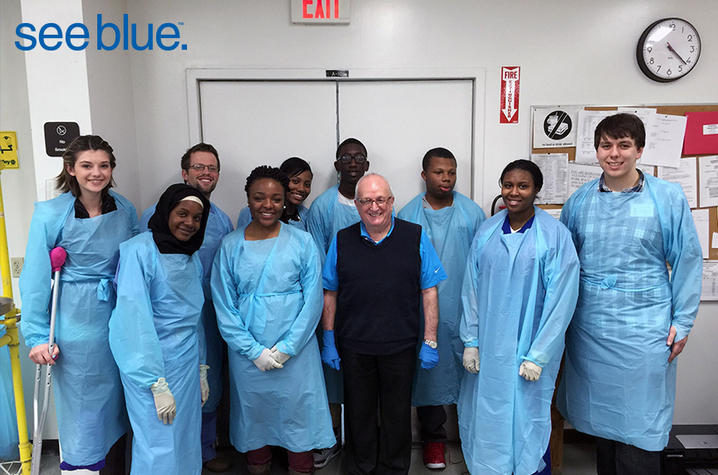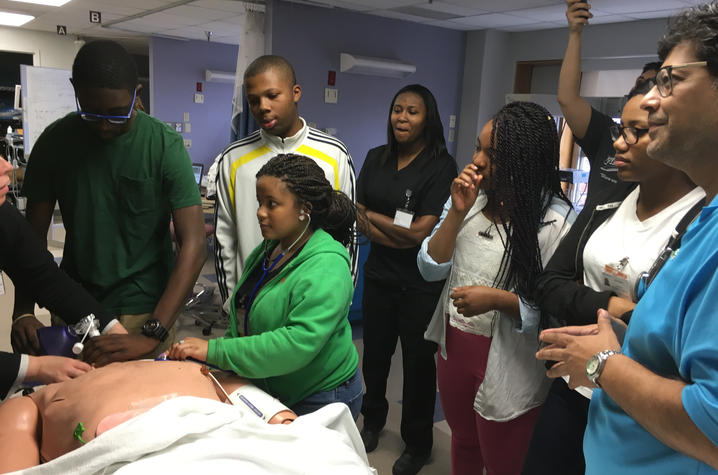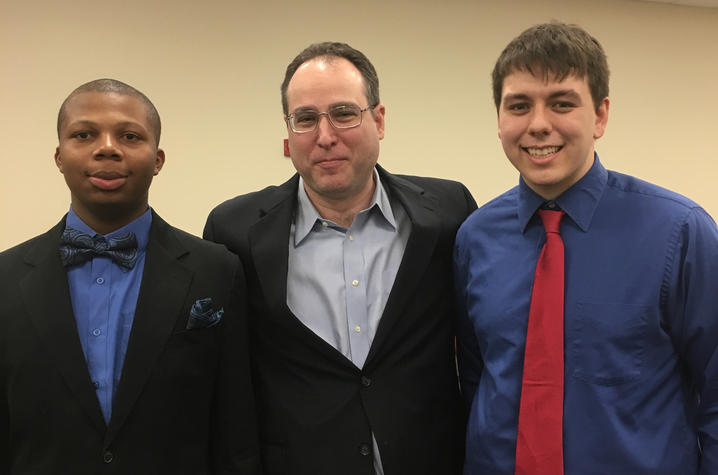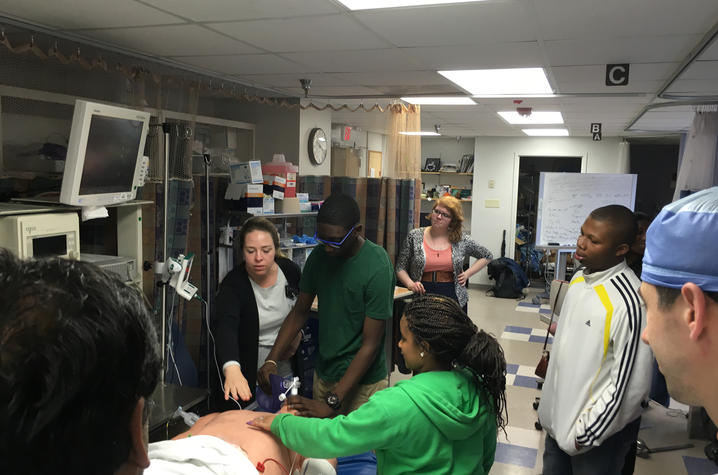UK Opens the Door of Possibility for Minority High School Students Interested in Health Care
LEXINGTON, Ky. (May 24, 2016) – Most high school students are exposed to history, biology and algebra classes, but a fortunate group of students from Lexington's Bryan Station High School (BSHS) had the unique opportunity during the past year to examine gross specimens in a pathology lab, tour hospital testing laboratories, attend medical lectures and even take part in an intensive care unit (ICU) simulation training, among other activities that are part of the curriculum for University of Kentucky medical students.
Four BSHS students were chosen by their school educators to participate in a health sciences mentoring program for economically disadvantaged but ambitious African American students. The program was developed by University of Kentucky undergraduate student Kevin Landwehr under the mentorship of assistant professor and Gill Heart Institute faculty member Dr. Michael Winkler, with support from the Department of Cardiovascular Medicine.
The BSHS students have participated in a large variety of activities such as human subjects researcher training, HIPAA training and certification and library science training (through the medical library). They also attended a life sciences entrepreneurship lecture via telecast from Rice University, toured and had lectures on hospital testing laboratories, attended an autopsy presentation, took part in simulation training via the simulation lab for ICU care, curriculum vitae sessions meant to prepare them for hospital jobs in the future, and many shadowing experiences in different departments from radiology and cardiology to neurosurgery.
"The kids especially enjoyed the cardiac cath lab on the second floor of the Gill Heart Institute where they were able to watch some procedures and have faculty members explain what was happening," said Kevin Landwehr, computer science undergraduate at the UK College of Engineering and a research assistant in Winkler's lab at the Gill Heart Institute. "We hope to have them complete their Basic Life Support certificate this coming week. One of our long term goals is to push for CPR training in high schools so there is more public awareness on basic life support services."
The Gill Junior Researchers pilot program’s goal is to mentor students throughout their education so that they matriculate to medical school or to another advanced degree program in health sciences. The students are selected for the program based on need and, as importantly, unrealized potential.
"Students in our program have been recommended by their teachers but their grades are not the initial focus; in fact, this program was designed for students who are ambitious but not necessarily high scoring," Landwehr said. "We started with sophomores because we wanted the students to be able to improve significantly through their interactions with their mentors. We wanted to firmly imprint upon them a durable enthusiasm for the health sciences that would not be impeded by temporary setbacks like a sporadic low grade or inability to access information within certain classes."
Landwehr, Winkler and their collaborators chose to focus their attention on Bryan Station High School as a starting point for the pilot program because, for now, it is Fayette County Public Schools' (FCPS) only consistently underperforming high school. If funding can be obtained to support the program, they plan to expand to other schools in Fayette County.
One of the BSHS students who participated in the pilot program was Dequorian Coulter. His mother describes him as kind of quiet and shy and a bit of a bookworm.
"When Dequorian was about 11 or 12, he asked if he could read some of my college textbooks on anatomy and physiology. He got very interested in the medical field and knows that one day he wants to be a neurosurgeon," said Tanel Coulter, Dequorian's mother.
"Since he's been in this program. I see a lot more confidence in him because he is doing something he wants to do and enjoys. What I enjoy the most is seeing and hearing the excitement in his voice when I pick him up from class on Thursday's. I'm really proud of him."
Winkler, who is a parent of two multi-ethnic special needs children, has been a vocal critic of Fayette County Public Schools' policies related to minority and special needs children for some time. After an encounter with the local NAACP at a school board meeting, Winkler says that two members of the organization encouraged him to temper his criticism by starting a positive proactive initiative for minority students. Winkler brainstormed about this suggestion with Landwehr, himself a minority student. Landwehr recommended a program to match what he would have liked to have experienced in high school himself.
"When we started this program, our vision was that it would be one of cascading mentorship,” said Winkler. “Faculty would mentor medical students, medical students would mentor undergraduates, and undergraduates would mentor the primary targets of the program, which are our BSHS students."
Winkler says he has two wonderful undergraduates who are his partners: Kevin Landwehr and Ashley Pittman. "Kevin co-founded the program with me and Ashley is taking over Landwehr's role as coordinator because he is applying to medical school here at UK."
Winkler's vision for the program has not come to complete fruition as infrastructure and funding is needed to ensure the survival of the program. He and Landwehr are members of a grant writing group led by Randa Remer, assistant dean of admissions and student affairs in the College of Health Sciences; and Christine Harper, assistant dean of admissions and student affairs in the College of Dentistry. Their group focuses on responding to grant requests for proposals, such as the Healthcare Opportunity Project Grant offered by the United States Health and Human Services agency. "If we meet with success, then we may have the opportunity to create a larger program that would include the Gill Junior Researchers," Winkler said.
Dr. Susan Smyth, chief of the Division of Cardiovascular Medicine and medical director of Gill Heart Institute, points to a critical challenge for the practice of medicine and science in terms of achieving equity in health care delivery and diversity in the workforce.
"This is an incredibly exciting and much needed program," she said. "We face very real inequities in the STEM workforce. As a university that embraces diversity of thought and strives to promote an inclusive environment, we will need to develop programs and process to affect change.
"By inculcating and nurturing in high school students in our community, they will develop identities and envision career paths in STEM and medical fields. The program that Michael, Kevin, and their team have developed is an important first step in the long journey to having a truly diverse and inclusive workforce."
Media Contact: Ann Blackford at 859-323-6442 or ann.blackford@uky.edu
UK is the University for Kentucky. At UK, we are educating more students, treating more patients with complex illnesses and conducting more research and service than at any time in our 150-year history. To read more about the UK story and how you can support continued investment in your university and the Commonwealth, visit uky.edu/uk4ky. #uky4ky #seeblue








